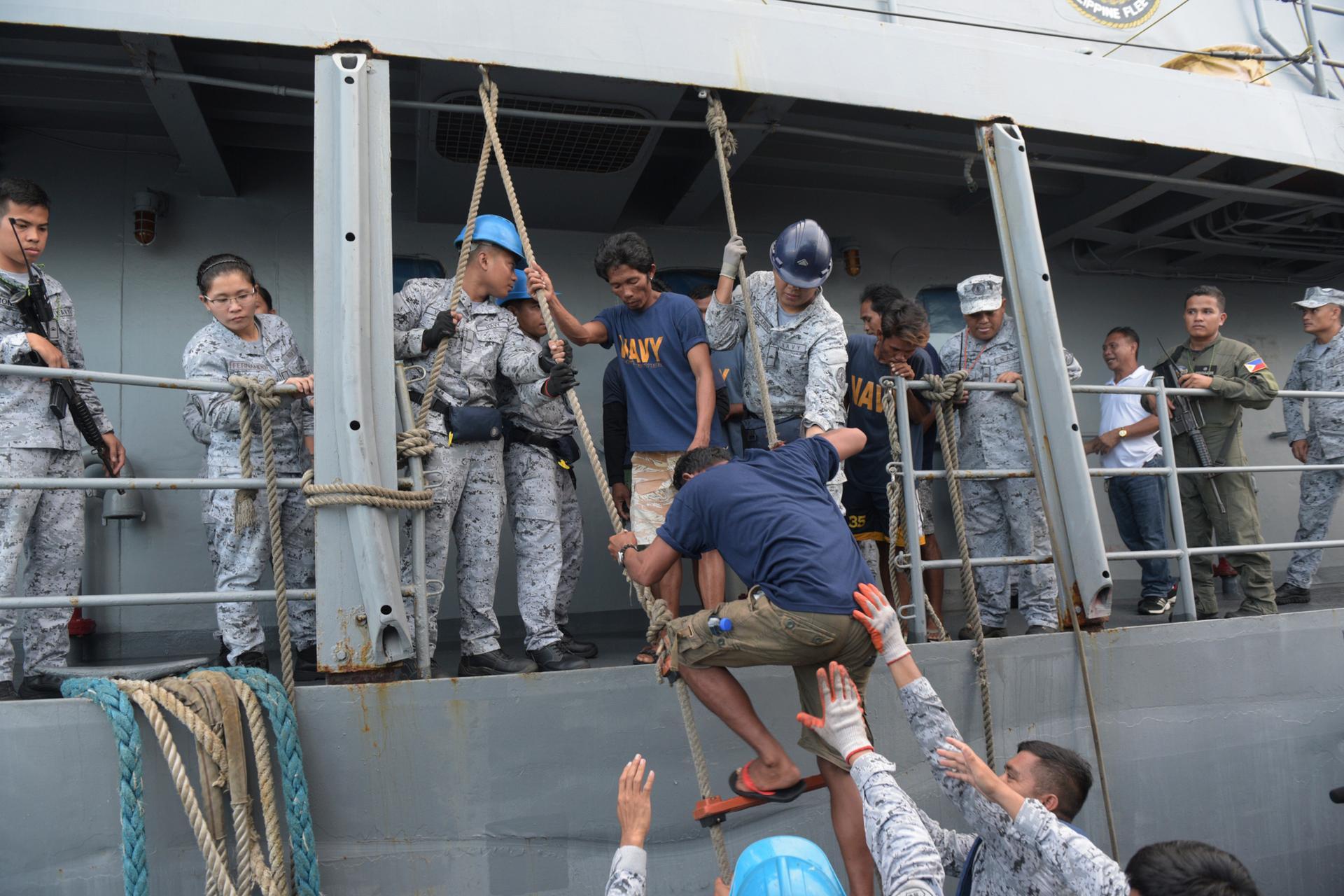A month on, a maritime accident in the South China Sea continues to develop into a political headache for Rodrigo Duterte, the president of the Philippines.
On Friday, demonstrators again gathered outside the Chinese embassy in Manila, as they have repeatedly since a Chinese vessel hit a Philippine fishing boat in mid-June, sinking it and leaving the 22 fishermen stranded in the sea for hours until they were rescued.
At the time, Mr Duterte – a man who built his political reputation by speaking frankly – said nothing for a week, before striking a conciliatory tone, calling it “just a collision”. Since then he has taken a quiet approach, but Filipinos have been outraged by the suggestion that the ramming was accidental. As one academic put it: “A running person does not accidentally hit another person standing in the middle of an empty football field.”
The incident occurred off the Philippine island of Palawan, in the vast archipelago known as the Spratly Islands. At the same time, on the western side of the Islands, in the area claimed by Vietnam, a second incident is playing out.
Media reports suggest that armed Vietnamese and Chinese coastguard vessels have been engaged in a week-long standoff, after a Chinese research ship, backed by armed support vessels, entered Vietnamese waters. Social media users have been tracking the vessels – and the lack of information in the Vietnamese media – but it isn't clear from public maritime vessel data if the standoff has ended.
Two approaches, but one problem: how can weaker countries get China to respect maritime boundaries across the South China Sea, a region it claims as its own almost in its entirety? Should they simply accept China's dominance, or is any disagreement with Beijing bound to lead to conflict? This is Mr Duterte's dilemma and it is one shared by nations bordering the South China Sea.
The protests in Manila were also to mark three years since an international arbitration tribunal in the Hague ruled in Manila's favour in a long-running dispute with China over fishing rights and oil and gas exploration. China has refused to recognise the ruling, but there was some hope that it would stop Chinese provocation in the Sea.
But it hasn't. Small incidents, such as the one in the West Philippine Sea, as the area is known in Manila, are China's preferred attritional strategy. Small enough to offer plausible deniability but regular enough to create a deterrent.
Fishermen from almost every country bordering the South China Sea have been harassed by Chinese vessels; sometimes arrested, sometimes having their catch seized, sometimes threatened.
The strategy is particularly effective because it targets poor people in remote areas. Each small dispute has a significant impact on the ability of a handful of fishermen to survive – they could lose their catch for several days, have their boats destroyed, be injured or killed. That creates a ripple outwards across the community and a powerful incentive for them to act cautiously.
Even if fighting words were forthcoming from Manila – which they have not been – that would count for little hundreds of miles west of the capital, among the sparsely populated reefs where the fishermen ply their trade.
Still, Vietnam has taken a different approach.
It has lodged official protests whenever its fishing boats were attacked by Chinese vessels. It has led the charge for a new, tougher code of conduct between China and other south-east Asian countries. And it has tried to have China's unilateral Air Defence Identification Zone – by which aircraft flying over contested waters must identify themselves to Chinese officials – declared illegal.
Unlike Mr Duterte, Hanoi appears to have decided to make even minor incidents as politically expensive for Beijing as possible.
Ultimately, this question turns on the assessment of political risk. Neither the Philippines nor Vietnam could win an open conflict with China. Hanoi appears to believe that its repeated pushback and diplomatic escalation will not result in a serious conflict.
Mr Duterte feels differently. Just last week, his spokesman Salvador Panelo gave a televised interview in which he posed an essentially unanswerable question: “What do these critics want the president to do? We're going to risk the lives of our people by making aggressive actions?”
By framing it as a matter of national security, Mr Duterte's spokesman is arguing that the president is in essence protecting Filipinos from being hurt in an unwinnable war with China, a perspective that appears to presuppose that China would immediately retaliate forcefully and that no one would support the Philippines in such a conflict.
And that is the second intriguing part of this dispute. It highlights that Manila does not expect the United States to back it in any conflict.
This is puzzling, given that as recently as February secretary of state Mike Pompeo flew to Manila to publicly affirm that the US would come to the Philippines' defence if the country came under attack in the South China Sea. Plainly, Mr Duterte does not believe those assurances. In Hanoi, perhaps, there is greater trust in the US.
Still, Mr Duterte is not the fundamental problem. The problem is China's apparent determination to return to great power politics rather than international law. Neither the US nor any other country can police every part of the vast South China Sea. Only by forcing Beijing to accept international rules can these skirmishes end.
For the moment, it is the Philippines and Vietnam who are caught in the crosshairs. But every country across the South China Sea will face a version of Duterte's dilemma: back down repeatedly in the face of small confrontations and have their own people turn on them, or stand up to China and risk facing the regional superpower alone.


